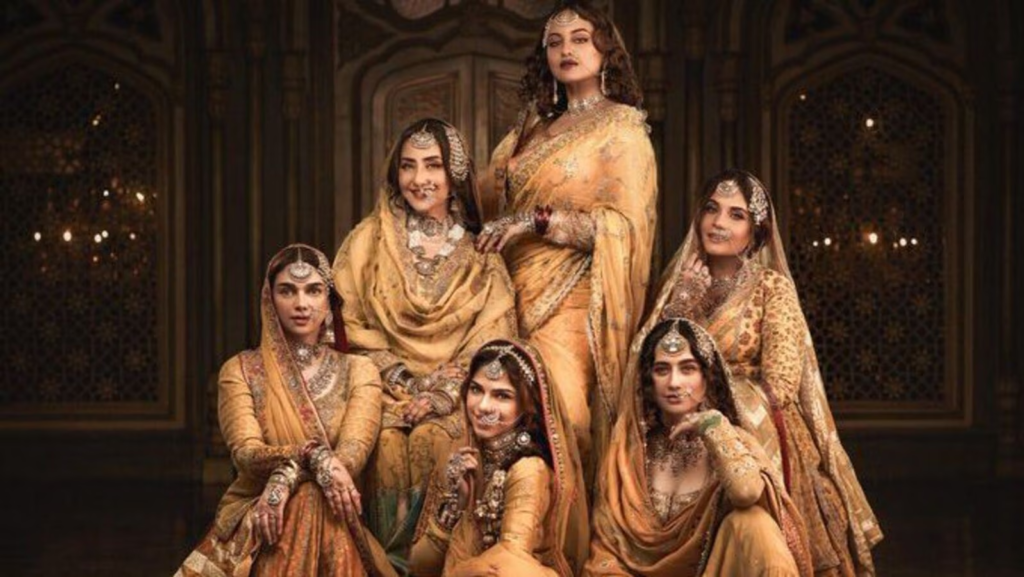Heeramandi reviews 2024: Netizens laud Sanjay Leela Bhansali, call his Netflix web series ‘masterclass’
Filmmaker Sanjay Leela Bhansali, renowned for his cinematic excellence, has come up with an epic drama series, Heeramandi reviews 2024: The Diamond Bazaar, which premiered on Netflix today, May 1.

It has been 30 years since Bhansali and Manisha Koirala last collaborated in their movie 1942: A Love Story. While Heeramandi reviews 2024 shares a genre similar to the 1994 classic movie, the new series delved into raw emotions, exploring themes of freedom, love, brothels, and jealousy.
Heeramandi reviews 2024
The series offers glimpses of movies like Gangubai Kathiawadi, Mandi, Kalank, and Devdas, but with a more refined portrayal of actors.
Heeramandi reviews 2024 The lead actors are Manisha Koirala (as Mallika Jaan), Sonakshi Sinha (Faradeen/Rehana), Richa Chadha (Lajjo), Sanjeeda Shaikh (Waheeda), Aditi Rao Hydari (Bibbo) and Sharmin Segal Mehta (Alamzeb).

The series marks the return of Fardeen Khan (as Wali Mohammed), complemented by performances from Jason Shah (Cartwright) and Taha Shah (Tajdar).
The series took 14 years to make and has gained momentum on the OTT platform. Each episode lasts 50 minutes to an hour.
Here are some viewer reactions to the series: Heeramandi reviews 2024
Aniruddha Haridas wrote, “Sanjay Leela Bhansali’s ‘Heeramandi’ is a masterclass on camera movement and mise-en-scène.”
Another netizen, Aayush Sharma, wrote, “#Heeramandi is a mesmerizing saga that pays homage to the unsung heroes of history. Bhansali ensures that his narrative reaches a wider audience while maintaining his signature cinematic flair. Manisha Koirala and Aditi Rao Hydari steal the show.”
Another social media user commented, “First episode and im already loving the chemistry b/w alamzeb and tajdar #Heeramandi [sic].”
Another netizen wrote, “@mkoirala Happy to see you after so long. A great piece of acting. By everyone in #Heeramandi. Surprised to see Fardeen can also act!”

Heeramandi reviews 2024 However, there were few who were no impressed with the Netflix series. Abhijit Iyer-Mitra took to X (formerly Twitter) and wrote, “Could anyone get past the first 15 minutes of #Heeramandi? I mean, great sets, but 2 songs within 15 mins & no plot in sight and terrible story telling
According to Filmfare magazine, in a recent chat, Sanjay Leela Bhansali revealed that he originally wanted to cast Rekha, Kareena Kapoor Khan, and Rani Mukerji when he first thought of Heeramandi 18 years ago
Who were the real courtesans at the heart of Netflix’s Heeramandi reviews 2024?
Indian director Sanjay Leela Bhansali is known for his big-budget Bollywood production, featuring grand sets, star casts, meticulously choreographed dance sequences and lavish costumes, jewellery and furnishings. His new series for Netflix, Heeramandi: The Diamond Bazaar, lives up to these expectations.
Against this visually rich backdrop emerge the scheming, menacing and murderous courtesans of Heeramandi.

Heeramandi reviews 2024 The series is set in Heeramandi, a historical red-light district of Lahore in present-day Pakistan. It unfolds against the backdrop of the Indian freedom struggle against British rule.
The show is an entanglement of plot lines – a murder investigation, a war of succession, a budding love story and a courtesan’s secret involvement in a rebellion against British rule.
Heeramandi reviews 2024 Eventually, all characters and storylines converge around the central theme of anti-colonial nationalism. Driven by nationalist fervour, the courtesans call themselves “patriots” and willingly sacrifice their careers and lives for the country.
But who were the real courtesans?
Role models for female independence Heeramandi reviews 2024
The show takes creative liberties by distorting the lives and timelines of the historical courtesans.
The North Indian tawa’ifs (courtesans), or nautch-girls (dancing girls, as the British called them), were cultural idols, female intellectuals and entrepreneurs.
Dating back to ancient India, these women were trained in music, dance, fashion, poetry, repartee, etiquette, languages and literature from a young age. Typically following a system of matrilineal inheritance, courtesans passed down their professional knowledge and skills to talented daughters of the household.
Heeramandi reviews 2024 Once trained, courtesans attracted patronage from royal courts, feudal aristocrats and colonial officers.
Heeramandi reviews 2024 This unique class enjoyed privileges not afforded to most women in Indian society, such as education and personal income. They led glamorous lifestyles, wielded power and wealth, and paid taxes.

Heeramandi reviews 2024 As independent professionals, they contributed to Indian arts and culture, travelled extensively, made connections with chosen kin and often embraced gender fluidity.
Their financial, political and sexual independence challenged patriarchal gender norms and restrictive Hindu moral laws that dictated the lives of women from upper-middle-class families.
Complicated relationships
In Heeramandi, the courtesans turn patriotic to avenge the British police officers for raping and killing the natives. While these actions are dramatic, the historical relationship between courtesans, the British empire and Indian nationalism was more complex.
The politically engaged Bibbojaan (Aditi Rao Hydari) mirrors Azizan Bai, a courtesan from Kanpur who is said to have financially supported the 1857 mutiny against the British East India Company.
While the mutiny was one of the most widespread anti-colonial revolts of the 19th century, Indian nationalism was not its primary aim, but a consequence. Azizan’s interest was in maintaining her patronage from the native rulers for her social and economic wellbeing.
Heeramandi reviews 2024 After 1857, India’s governance shifted from the East India Company to the Crown, leading to the spread of British rule across India alongside Western education and Victorian morality. Meanwhile, nationalist leaders envisioned a nation as a pure land of sacred Hindu ancestors and valued chastity in women.
Both the imperial and nationalist ideals clashed with the courtesans’ sexual freedom.
In the 1890s, Hindu reformers and bourgeois nationalists joined Christian missionaries in organising anti-nautch campaigns that advocated boycotting them to “rescue” art and culture from perceived immorality. This led to the downfall of the courtesan class.
In Heeramandi, patronage diminishes and the women’s dreams of marriage fade. The courtesans shut down their salons, give up their careers and sacrifice their lives for the nation.
But historical courtesans were quick to reinvent themselves in the face of declining patronage and social stigma.
They turned to the power of modern technology. Gauhar Jaan, a famous courtesan, became a celebrated concert singer and gramophone artist, earning the title of “India’s Melba” in the international press.
In 1921, Gandhi asked Gauhar Jaan to perform for the Swaraj Fund. Aware of the ambiguous position courtesans held in nationalist discourse, she agreed on the condition that Gandhi attend her performance. When Gandhi failed to show up, she contributed only half of the raised amount to the cause.
Courtesans contributed significantly to the founding of the Indian film industry through their artistry, star power and capital investment. The first generation of female film stars came from courtesan backgrounds: Jaddan Bai, Kajjan Bai, Akhtaribai Faizabadi and Naseem Banu entered the industry as actors, singers, composers, directors and studio owners.
Later, some acted as managers and costume designers for their daughters, the emerging actors of the next generation.
By becoming modern-day artists, the courtesans preserved their art. They remained visible and relevant in a society that was increasingly obliterating women’s cultural contributions and diminishing their role as citizens in an emerging nation.
Patriarchal nationalism
In the show, a woman’s value is judged by her respectability, marital status and the presence of a male guardian controlling her sexuality. Courtesans refer to themselves as “birds in gilded cages” and dream of freedom from their courtesan lifestyle.

Here, the courtesans’ nationalism resonates with present-day far-right Hindu nationalists, seemingly promising women empowerment in nationalism but, in reality, reserving only regressive roles for women.
Heeramandi oversimplifies the multilayered persona of tawa’ifs. The series portrays them as melancholic victims yearning for patriarchal married bliss, while remaining marginalised in respectable society. But these women should be remembered as celebrated figures filled with joie-de-vivre, gusto and spiritedness.
They should be honoured for their strategies of self-representation and processes of self-determination, as they turned resilience into a way of life.



